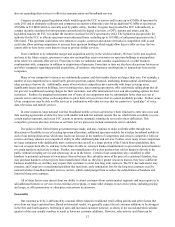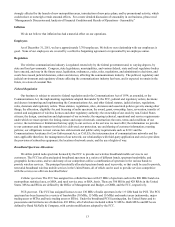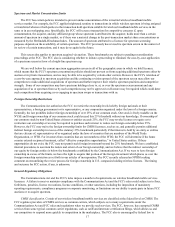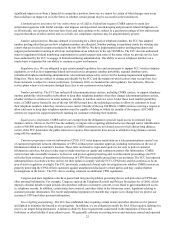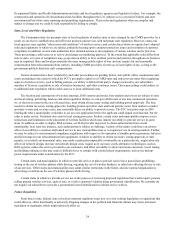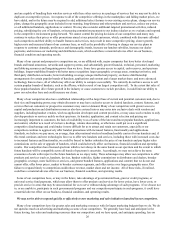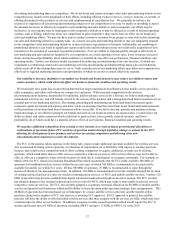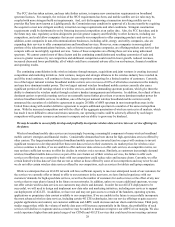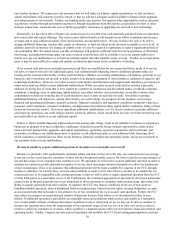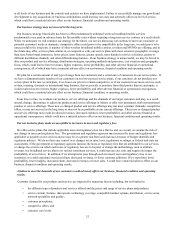Metro PCS 2011 Annual Report Download - page 33
Download and view the complete annual report
Please find page 33 of the 2011 Metro PCS annual report below. You can navigate through the pages in the report by either clicking on the pages listed below, or by using the keyword search tool below to find specific information within the annual report.22
significant impact on us from a financial or competitive position; however, we cannot be certain of what changes may occur
that could have an impact on us in the future or whether certain groups may be successful in their endeavors.
Communications assistance for law enforcement act (CALEA). Federal law requires CMRS carriers to assist law
enforcement agencies with lawful wiretaps, and imposes wiretap-related record-keeping and personnel-related obligations on
us. Historically, our customer base may have been, and may continue to be, subject to a greater percentage of law enforcement
requests than those of other carriers and, as a result, our compliance expenses may be proportionately greater.
Number administration. Because demand is increasing for a finite pool of telephone numbers, the FCC has adopted
number pooling rules that govern how telephone numbers are allocated. Number pooling is mandatory inside the wireline rate
centers that are located in counties included in the top 100 MSAs. We have implemented number pooling procedures and
support pooled number roaming in all of our metropolitan areas which are in the top 100 MSAs. The FCC also has authorized
states to supplement federal numbering requirements in certain respects and some of the states where we provide service have
been authorized by the FCC to engage in limited numbering administration. Our ability to access telephone numbers on a
timely basis is important for our ability to continue to grow our business.
Regulatory fees. We are obligated to pay certain annual regulatory fees and assessments to support FCC wireless industry
regulation, as well as fees supporting federal universal service programs, number portability, regional database costs,
centralized telephone numbering administration, telecommunications relay service for the hearing-impaired and application
filing fees. These fees are subject to change periodically by the FCC and the manner in which carriers may recoup these fees
from customers is subject to various restrictions. In January 2010, we launched tax and regulatory fees inclusive, flat-rate
service plans where we do not pass through these fees to our customers on such plans.
Number portability. The FCC has ordered all telecommunications carriers, including CMRS carriers, to support telephone
number portability which enables subscribers to keep their telephone numbers when they change telecommunications carriers,
whether wireless to wireless or, in some instances, wireline to wireless, and vice versa. Under these local number portability
rules, a CMRS carrier located in one of the top 100 MSAs must have the technology in place to allow its customers to keep
their telephone numbers when they switch to a new carrier. Outside of the top 100 MSAs, CMRS carriers receiving a request to
allow end users to keep their telephone numbers must be capable of doing so within six months of the request. All CMRS
carriers are required to support nationwide roaming for customers retaining their numbers.
Equal access. At present, CMRS carriers are exempt from the obligation to provide equal access to interstate long
distance carriers. However, the FCC has the authority to impose rules requiring unblocked access through carrier identification
codes or 800/888 numbers to long distance carriers so CMRS customers are not denied access to their chosen long distance
carrier, if the FCC determines the public interest so requires. Our customers have access to alternative long distance carriers
using toll-free numbers.
Customer proprietary network information (CPNI). FCC rules impose restrictions on a telecommunications carrier's use
of customer proprietary network information, or CPNI, without prior customer approval, including restrictions on the use of
information related to a customer's location. These rules are broad in scope and require us not only to protect customer
information ourselves, but also to take steps to make sure that our agents and contractors protect this information. CMRS
carriers must take reasonable measures to discover and protect against pretexting and, in enforcement proceedings, the FCC
will infer from evidence of unauthorized disclosures of CPNI that reasonable protections were not taken. The FCC has imposed
substantial fines on certain wireless carriers for their failure to comply with the FCC's CPNI rules and this continues to be an
area of active regulatory oversight. The FCC previously conducted a broad scale investigation into whether CMRS carriers are
properly protecting the CPNI of their customers against unauthorized disclosure to third parties and may conduct further
investigations in the future. The FCC also is seeking comment on additional CPNI regulations.
Congress and state legislators also have passed and may pass legislation governing the use and protection of CPNI and
other personal information. For example, Congress enacted the Telephone Records and Privacy Protection Act of 2006, which
imposes criminal penalties upon persons who purchase without a customer's consent, or use fraud to gain unauthorized access
to, telephone records. In addition, certain states have enacted, and other states in the future may enact, legislature relating to
customer personal information. The recent and pending legislation (if enacted) may require us to change how we protect our
customer's CPNI and other personal information.
Tower lighting and painting. The FCC has established rules requiring certain towers and other structures to be painted
and lighted to minimize the hazard to air navigation. In addition, we are obligated to notify the FAA if the required lighting at a
tower is no longer being maintained. A failure to abide by these requirements could result in the imposition of fines and
forfeitures or other liability if an accident occurs. We generally collocate on existing towers and structures owned and operated


